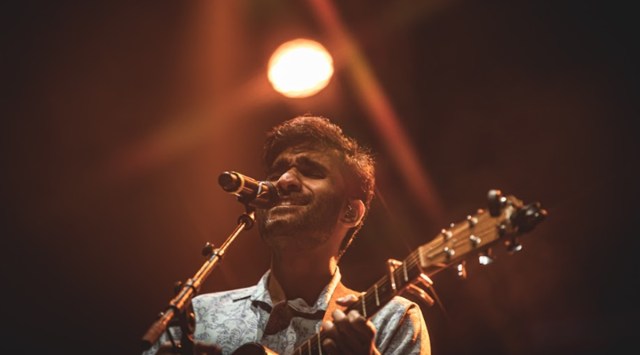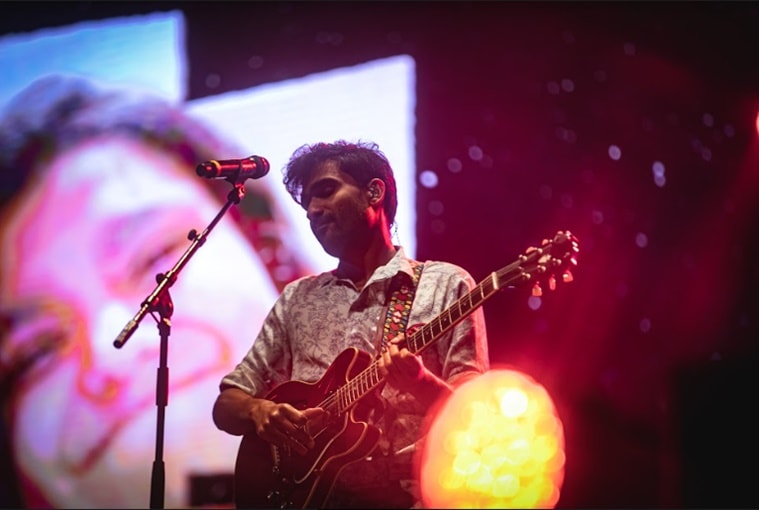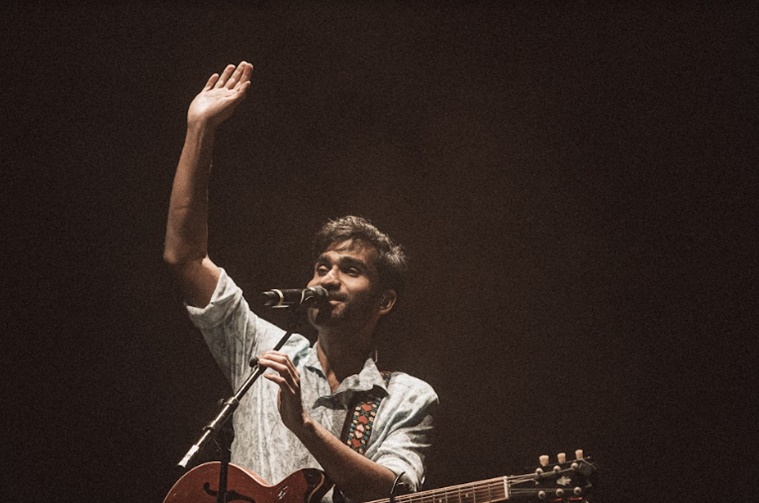‘Music streaming has democratised the industry’: Prateek Kuhad on whether Spotify and Apple Music pay artists enough
The pop artiste from Rajasthan discusses his latest album’s electronic sound, why love and hope still dominate his songs, and whether music streaming revenues are fair to artists
 With most of his writing happening in quiet spaces and studios, however, Kuhad’s relationship with the stage has been tenuous. A socially anxious and introverted youngster, he has had to adapt to the energy of performing for so many people. (Picture credit: Baricci)
With most of his writing happening in quiet spaces and studios, however, Kuhad’s relationship with the stage has been tenuous. A socially anxious and introverted youngster, he has had to adapt to the energy of performing for so many people. (Picture credit: Baricci) When a heavily bearded man in his thirties shrieked from the crowd, “We love you, Prateek!” halfway through the pop songwriting sensation’s introduction of a song from his latest album, The Way that Lovers Do, people around him burst out laughing. The effusive (and very obviously male) proclamation of love even earned an amplified chuckle from the diminutive Kuhad onstage, dressed in a silvery rolled-up floral shirt and chino pants, his short hair neatly slicked back, the grip on his dreadnought acoustic guitar tight. “I put out this song early this year, and it’s one of my favourites,” continued Kuhad, before blue floodlights spun to him and he strummed Co2’s first chord, crooning, “Maybe I was wrong and you were right…”
Once the drums kicked into a striding rhythm and led to feet swaying, hands entwining and booze filling cups all over the massive Airia Mall ground in Gurgaon last month, the 8000-plus crowd seemed to recognise that the apotheosis of this night-time Prateek Kuhad concert was approaching. The female trio in a corner of the stage was supplying harmonies, the keyboardist a Rhodes backdrop, the bassist mild thumps, and Kuhad the vocals in the centre, his eyes closed. This show featured songs from across his discography and was attended by live Kuhad newbies and veterans. Teenage girls, grey-haired couples, smoking musicians and thirty-something corporate honchos roamed the venue, the dizzying diversity of Kuhad’s fanbase — a testament to his universal appeal.
“He’s the kind of artiste families can listen to together,” said Shivangi Shukla (31), next to a food stall, with her friend, Nupur Khanna (40), who added, “Yeah, I’d bring my parents to this.” Rini Chatterjee (35), a diehard fan who claims to have attended Kuhad’s shows in Pune back in 2017, when “nobody knew him”, was at the concert with her partner: “His music is very hopeful, it’s just what you need after a long day. He speaks of emotions that everyone can relate to, which transcend generations…”
 “Growing up, I never listened to much electronic music. I was into singer-songwriters. That’s why my earlier songs have that influence,” says Kuhad. (Picture credit: Baricci)
“Growing up, I never listened to much electronic music. I was into singer-songwriters. That’s why my earlier songs have that influence,” says Kuhad. (Picture credit: Baricci)
Days later, Kuhad, his arm hanging over a cushioned chair, says something similar over a Zoom call: “I write about lots of stuff that’s universal. Heartbreak is something you’ll experience from ages seven to 70, just like hope, just like deep love. The more I do this, I realise that I’m very curious about human motivation. That’s why so much of it is about love.” And that love is seemingly reciprocated. Kuhad is currently wrapping up a two-month national tour in which he’s already hit 14 cities with thousands of attendees, with the last show in Goa tonight. The tour follows the release of his latest album, which is a departure from his previous sound: no more five-piece band setups with minimalist production. It’s electronica time.
The album’s first song, All I Need, begins on a synthesised beat with multi-octave vocals, and sets up an upbeat tone for the following songs. This change in style is, according to Kuhad, a natural progression of his songwriting tastes and skills.
“Growing up, I never listened to much electronic music. I was into singer-songwriters. That’s why my earlier songs have that influence,” he says, adding that his earliest release, Raat Razi, employs simple guitar, bass and vocals because he simply “didn’t know what else to do.” But on this album, after many years of listening to and playing multiple styles of music, he realised he wanted to shed that “stripped-down” approach: “I wanted to go all out. I didn’t want to hold back… It’s what led to these lush, bigger arrangements.”
 “I just wanted to make the bare minimum when I was starting out and that was only possible for me because of how the landscape of music has changed with streaming and independent distributors,” he says. (Picture credit: Baricci)
“I just wanted to make the bare minimum when I was starting out and that was only possible for me because of how the landscape of music has changed with streaming and independent distributors,” he says. (Picture credit: Baricci)
The thematic focus of this album, though, wasn’t as deliberate. Its third song, Favourite Peeps, is one of the few by Kuhad that talks about unromantic love. It tells the story of someone heartbroken, mended and supported and put together by his friends and family — but that wasn’t the original intent. “I don’t approach writing like that,” says Kuhad. “I absorb a lot of information through music, films, reading, conversations, going out or introspecting… and then when I sit down to write, I try not to overthink. That’s how Favourite Peeps happened: a couple of lines came out, and I thought, okay, I guess this song is about that.”
With most of his writing happening in quiet spaces and studios, however, Kuhad’s relationship with the stage has been tenuous. A socially anxious and introverted youngster, he has had to adapt to the energy of performing for so many people. “Over the years, I’ve grown, and now I quite enjoy the stage,” he says, “But songwriting is still what’s most creatively fulfilling for me.”
It’s those efforts that won him recognition for a thundering independent rise by Spotify and Apple Music in 2019. Such music streaming platforms have helped create a musician middle-class, according to Kuhad, as opposed to the era of record labels which allowed “only a few artists at the top to earn a lot, and everybody else almost nothing.”
“I just wanted to make the bare minimum when I was starting out and that was only possible for me because of how the landscape of music has changed with streaming and independent distributors,” he says. “We should keep this in perspective… instead of complaining about streaming payments. The process will evolve, it will get fairer. It already has.”
📣 For more lifestyle news, follow us on Instagram | Twitter | Facebook and don’t miss out on the latest updates!
Photos






- 01
- 02
- 03
- 04
- 05





















